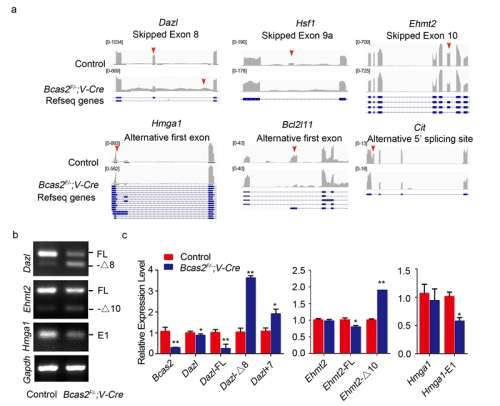Scientists discover BCAS2 involved in alternative mRNA splicing in spermatogonia and the transit to meiosis

Alternative splicing significantly expands the form and function of the genome of organisms with limited gene numbers and is especially important for several stages of mouse spermatogenesis.
In addition, a number of trans-acting regulators of pre-mRNA splicing are primarily or exclusively expressed in mouse testis and may regulate the proper alternative splicing of germ cells.
Despite protracted effort, deciphering how pre-mRNA splicing functions during spermatogenesis remains a great challenge for the field.
Recently, a work led by Prof. LI Lei in Institute of Zoology, Chinese Academy of Sciences, reported that BCAS2 is involved in alternative mRNA splicing in mouse spermatogonia and the transition to meiosis.
In fact, BCAS2 is a small protein conserved in organisms and may play important roles in several processes including pre-mRNA splicing and DNA damage.
Previously, Dr. LI's research showed BCAS2 protects the genomic integrity of mouse preimplantation embryos.
Strikingly, in this study, they found that BCAS2 is specifically enriched in spermatogonia of mouse testes. Conditional disruption of Bcas2 in male germ cells impairs spermatogenesis and leads to male mouse infertility.
Although the spermatogonia appear grossly normal, spermatocytes in meiosis prophase I and meiosis events (recombination and synapsis) are rarely observed in BCAS2-depleted mouse testis.
Taking advantage of this model, they demonstrated an important role of BCAS2 involved in pre-mRNA splicing in the mitosis-to-meiosis transition of mouse spermatogonia.
This research provides the first evidence for alternative splicing machinery regulating meiosis initiation in germ cells during mouse spermatogenesis and has been published online in Nature Communications in an article titled "BCAS2 is involved in alternative mRNA splicing in spermatogonia and the transition to meiosis."
More information: "BCAS2 is involved in alternative mRNA splicing in spermatogonia and the transition to meiosis" Nature Communications, DOI: 10.1038/NCOMMS14182
Journal information: Nature Communications
Provided by Chinese Academy of Sciences



















